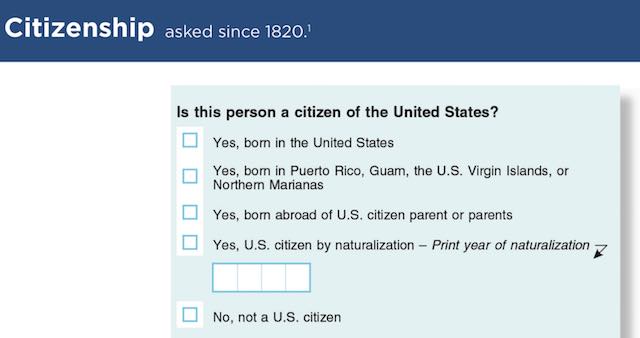A debate over whether or not to include a citizenship question on the upcoming census has raged as 2020 draws near. It recently wound up before the Supreme Court.
The debate arose when the Commerce Department announced that it would be including a question about one’s citizenship status on the 2020 census.
That led to a flurry of criticism, largely along party lines, about whether or not it should be included.
Lawsuits were also filed against the Trump administration by some states and the ACLU saying the question would intimidate immigrant communities and deprive them of political representation since the census is used to determine Congressional districts.
The Supreme Court heard arguments on the case in April, and a decision is expected soon.
Legislation
Bills have been introduced in Congress both prohibiting and allowing this question.
Eleanor Holmes Norton (D-DC) introduced a bill in the last session of Congress that would have blocked the question from being on the census. It never advanced.
More recently, a bill (S. 1358) was introduced by Senator Steve Daines (R-MT) that would require a citizenship status question to be on all census forms from 2020 on.
“This is America,” Daines said. “We are a sovereign nation. It’s absurd that we don’t know how many citizens and non-citizens are living in this country. That’s why I’m introducing this bill to require a citizenship question on the census.”
History
Proponents of including the question note that it has been asked in the past. A question about one’s citizenship or naturalization began to be included in the mid 1800s and remained there through the 1950 census.
In fact, the census historically has asked many questions about the lives of people living in America depending on what Congress wanted to know about at any given time.
According to the Indiana Business Research Center, before slavery was outlawed, the census asked homes about the number of free white males over and under the age of 16, free white females, other free persons, and slaves living in each.
In the early 1800s, questions about manufacturing were added. By 1850, over a dozen questions were asked including place of birth, real estate value, profession, and whether or not a person could read or write.
“It should be noted that the census questions multiplied decade after decade. During the mid-1900s, the Census Bureau began taking on more and more surveys – ‘sampling’ the population rather than asking everyone. These surveys supplemented what Congress wanted to know about the people living and working in their communities,” writes Carol O. Rogers, Deputy Director and CIO at the Indiana Business Research Center, Indiana University Kelley School of Business.
An article in the Georgetown Law Journal describes the sprawl that occurred in census questions due to political interests:
By the fourth census, however, Congress recognized the census’s unique status as one of the few tools for collecting demographic information on the developing nation and expanded its scope to include all types of tangential questions about the population. The 1820 Census included nearly thirty new classifications—including a question asking for the number, but not the names, of “[f]oreigners not naturalized” in the respondents’ household. The 1840 Census included additional questions about insanity, occupation, and school attendance.
Thomas P. Wolf and Brianna Cea, the article’s authors, went on to add that the Framers of the Constitution left management of the census to Congress and “did not create a full-time civil service component to administer the census.”
“In this environment, the census became a target for early legislative lobbyists, who pushed members of Congress to add questions—including the earliest iterations of citizenship questions—to satisfy emergent exigencies,” said Wolf and Cea.
A Final Verdict?
Now that the Supreme Court is taking on the citizenship question debate for the upcoming census, it will be interesting to see what impact the Court’s decision has on adding questions. It is clearly a politicized debate and historically has been used as such based on the interests of Congress.
Will the census go back to strictly seeking a head count? A decision is expected by June. Stay tuned…



